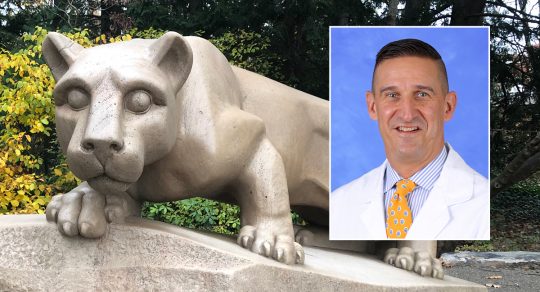
College of Medicine
Addressing Rural Health
Improving Rural Health Through Innovation

Our Commitment
Like many states across our nation, Pennsylvania is 70 percent rural, which requires a collective, multisector approach to improve the health of each of these vulnerable communities.
The College of Medicine is committed to the University’s land-grant mission by training the next generation of health care providers, researchers, public health scientists and community members dedicated to working together to develop an inclusion innovation approach to combat the rural health disparities in Pennsylvania and beyond.
Addressing Health Inequities in Rural Communities and Beyond

Dedicated Center
With a mission to bridge the gap in health equity in rural communities, Penn State College of Medicine has launched the Center for Advancing Health Equity in Rural and Underserved Communities (CAHE-RUC). This novel, groundbreaking center is dedicated to studying, addressing and reducing health disparities affecting rural and underserved communities in Pennsylvania and beyond.
The center will initially focus on reducing cancer health disparities and improving health literacy and education in cardiovascular health, cancer, and diabetes for minority, underserved and rural populations. In the long term, CAHE-RUC intends to expand patient-centered health research that is grounded in precision medicine and implementation science to address health disparities.

Addressing Risk Factors
Heart disease, cancer, diabetes and stroke are among the most common causes of illness, disability and death in the United States. These chronic conditions—and factors that lead to them—are more common or severe for some racial and ethnic groups. The College of Medicine has secured more than $10 million in Racial and Ethnic Approaches to Community Health grant funding to address these disparities among Hispanic populations in central Pennsylvania. Non-Hispanic and Hispanic Black bisexual women who live in rural areas have the highest prevalence of experiencing suicidal thoughts and behaviors, according to College research. A “first-of-its-kind study,” published in JAMA Psychiatry, revealed how demographic factors intersect to affect risk of having suicidal thoughts and behaviors.

Addressing Needs in Rural Pennsylvania
Through research, education, clinical care and community outreach, faculty, staff and students are making a positive impact on residents of Pennsylvania and beyond. Pediatrician and researcher Deepa Sekhar, MD, spearheads a project to develop a community-based program to better prepare children living in rural Dauphin County for kindergarten who otherwise cannot enroll in preschool.
As future providers, MD students at University Park gain first-hand experience in caring for and creating opportunities to improve the health of rural Pennsylvanians. uses a student-led free clinic model to increase access to health care, address food insecurity, promote economic development and enhance sustainability practices in under-resourced communities.
Science in 60 Seconds: Improving Rural Health
Dr. Michael McShane, assistant professor of medicine and faculty member at Penn State College of Medicine's University Park campus, explains how faculty and students confront the challenges of access to health care in rural communities.
Director Fornessa Randal talks about the , a unique academic, community-level partnership dedicated to the comprehensive evaluation and implementation of evidence-based, community-level strategies to improve health outcomes in rural and underserved communities.
Dr. Alice Zhang, assistant professor of family and community medicine at Penn State College of Medicine, talks about bringing free health resources to the community using "Health to Go" vending machines.
Penn State College of Medicine’s dean, Dr. Karen Kim, discusses the school’s focus on building a better infrastructure to address rural health and training the next generation of physicians prepared to care for rural communities.
Battling the Opioid Epidemic with Creative Approaches

Drone Delivery
A multidisciplinary team led by Penn State College of Medicine’s Aleksandra Zgierska, MD, PhD, professor of family and community medicine, comprised of physicians, first responders, and drone and aviation experts are exploring the use of drones to deliver the overdose reversal drug, Naloxone, to hard-to-reach communities. Using the power and efficiency of drones in Pennsylvania’s Cambria County, where overdose deaths have skyrocketed, the goal is to create a scalable model for delivery drones to work in collaboration with emergency responders during medical emergencies to reduce response time in already-underserved areas.

Vending Machines
Vending machines aren’t just for snacks. Researchers co-led by Alice Zhang, MD, MPH, assistant professor of family and community medicine and Zgierska, have identified an innovative way to address diseases of despair and health disparities in Harrisburg and Reading, Pennsylvania, by utilizing vending machines to provide free harm reduction tools including Naloxone, Fentanyl test strips and contraceptives. Working with community organizations and government officials, the vending machines will be placed in highly visible and easily accessible locations to encourage the use of the available free products.

New Treatments
Sadly, substance abuse disorders including opioid use disorders and the accompanying standard of care, Medication Assisted Treatment are highly stigmatized. What if there was another effective way? College of Medicine researchers Patricia Grigson-Kennedy, MS, PhD, and Scott Bunce, PhD, MA , are the first in the country to test the efficiency of Glucagon-like peptide-1 receptor agonists (GLP-1RAs) like liraglutide (Saxenda®) and semaglutide (Ozempic®) for the treatment of opioid use disorder in people. Findings suggest that the GLP-1R agonist, liraglutide, is safe and effective in reducing cravings in opioid use disorder.






